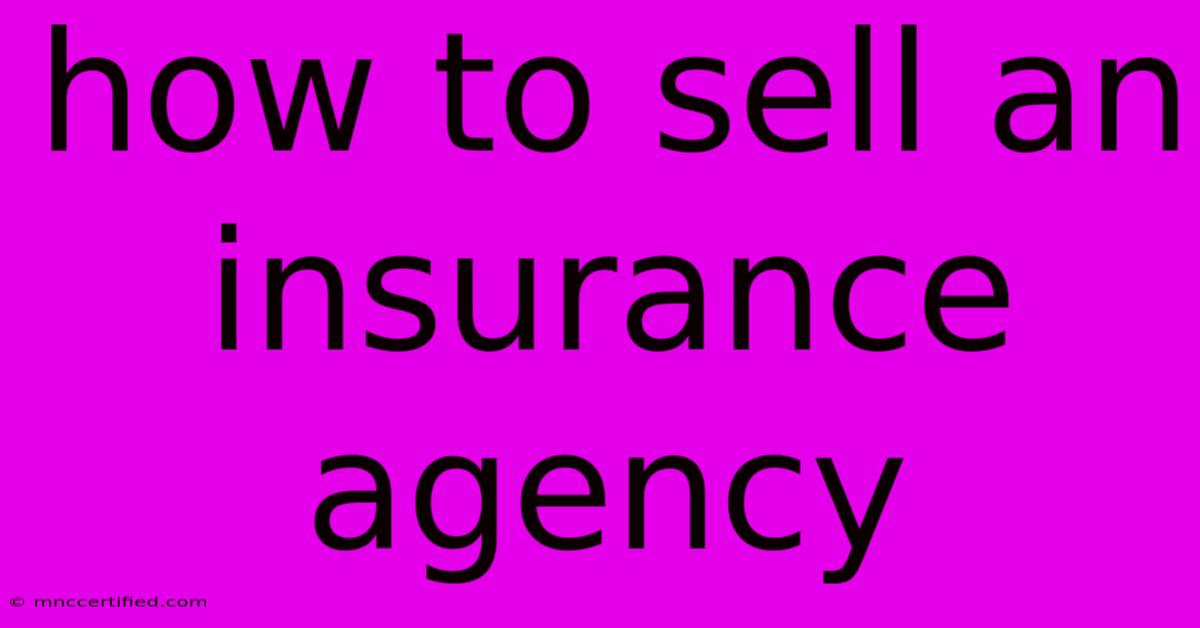How To Sell An Insurance Agency

Table of Contents
How to Sell Your Insurance Agency: A Comprehensive Guide
Selling your insurance agency is a significant undertaking, requiring careful planning and execution. This comprehensive guide will walk you through the process, from preparing your agency for sale to navigating the closing process. Understanding the intricacies of this transaction is crucial for maximizing your return and ensuring a smooth transition for your clients and employees.
1. Preparing Your Agency for Sale: Laying the Foundation for Success
Before even considering listing your agency, you need to lay a strong foundation. This involves several key steps:
1.1 Assess Your Agency's Value: Understanding Your Worth
Accurately assessing your agency's value is paramount. Several factors contribute to this valuation, including:
- Revenue: Consistent and growing revenue streams are highly desirable to potential buyers.
- Profitability: A healthy profit margin demonstrates the agency's efficiency and sustainability.
- Client Retention: Low churn rates indicate a loyal client base and a strong business model.
- Employee Retention: Experienced and skilled employees are valuable assets.
- Book of Business Quality: The composition of your client portfolio (high-value clients, diverse product lines) impacts value.
- Location: A desirable geographic location can enhance the agency's appeal.
Consider engaging a business valuation expert to obtain a professional assessment. This provides an objective measure of your agency's worth and helps set realistic expectations.
1.2 Improve Financial Performance: Enhancing Attractiveness to Buyers
Potential buyers scrutinize financial records. Before listing, focus on:
- Clean Up Your Financials: Ensure accurate and up-to-date accounting records. Any discrepancies can raise red flags.
- Increase Profitability: Identify areas to streamline operations and boost profitability.
- Reduce Debt: Lowering debt makes your agency more attractive to potential buyers.
- Diversify Revenue Streams: A diversified portfolio demonstrates resilience and reduces risk.
1.3 Document Everything: Streamlining the Due Diligence Process
Buyers will conduct thorough due diligence. Prepare comprehensive documentation, including:
- Detailed Financial Statements: Multiple years of audited financial statements are essential.
- Client Contracts and Agreements: Organized and readily accessible client documentation.
- Employee Records: Comprehensive records of employee contracts, compensation, and performance.
- Insurance Licenses and Certifications: Proof of compliance with all relevant regulations.
- Operational Manuals: Clear procedures and processes for daily operations.
2. Choosing the Right Sales Strategy: Finding the Perfect Buyer
How you choose to sell will greatly impact your outcome. Consider these options:
2.1 Selling to a Larger Insurance Brokerage: Mergers and Acquisitions
Selling to a larger brokerage is a common route. These firms often seek to expand their market share and acquire profitable agencies. Benefits include a potentially higher sale price and a smooth transition.
2.2 Selling to a Private Equity Firm: Access to Capital
Private equity firms may be interested in acquiring well-established agencies with strong growth potential. They often invest in scaling businesses, providing access to capital and resources.
2.3 Selling to an Employee Stock Ownership Plan (ESOP): Employee Retention
An ESOP allows your employees to purchase the agency, offering a seamless transition and potentially higher employee retention. However, it involves complex legal and financial considerations.
2.4 Selling Directly to Another Independent Agent: Building on Success
Finding a suitable independent agent willing to take the reins can ensure a smooth handover to a buyer who understands the nuances of your business.
3. The Selling Process: Navigating the Transaction
This phase involves several crucial steps:
3.1 Engaging a Broker or Investment Banker: Professional Guidance
A seasoned broker or investment banker can provide invaluable guidance throughout the process. They can assist with valuation, marketing your agency, negotiating offers, and managing the closing process.
3.2 Marketing Your Agency: Attracting Potential Buyers
Effective marketing is key. This involves creating a compelling presentation highlighting your agency's strengths and potential.
3.3 Negotiating the Sale Agreement: Protecting Your Interests
Negotiating the sale agreement requires careful attention to detail. Engage legal counsel to review and protect your interests.
3.4 Due Diligence and Closing: The Final Steps
Thorough due diligence is conducted by the buyer. Once completed, the closing process involves transferring ownership and finalizing all legal and financial matters.
Conclusion: A Successful Transition
Selling your insurance agency is a complex yet rewarding endeavor. Thorough preparation, a well-defined sales strategy, and professional guidance are crucial for maximizing your return and ensuring a successful transition for all stakeholders. By following these steps, you can confidently navigate this process and achieve your desired outcome. Remember to consult with legal and financial professionals throughout the entire process to ensure you are fully protected and informed.

Thank you for visiting our website wich cover about How To Sell An Insurance Agency. We hope the information provided has been useful to you. Feel free to contact us if you have any questions or need further assistance. See you next time and dont miss to bookmark.
Featured Posts
-
Monday Outage Microsoft 365 And Outlook
Nov 26, 2024
-
Thanksgiving Storm Severe Weather Alert
Nov 26, 2024
-
Menendez Case Whats Next
Nov 26, 2024
-
Tractor Creates Flood Wave Police Investigate
Nov 26, 2024
-
Snow Possible On Thanksgiving
Nov 26, 2024